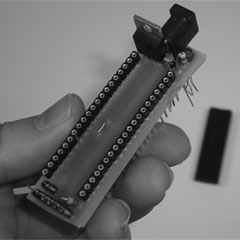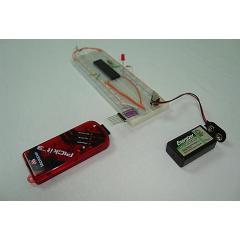Categories
- animatronics (12)
- apple (11)
- arduino (179)
- art (41)
- articles (121)
- artificial intelligence (11)
- automation (421)
- avr (205)
- bitcoin (3)
- breadboard (9)
- cameras (57)
- cars (26)
- cell phones (28)
- clothing mods (21)
- console mods (26)
- dangerous (94)
- desktop mods (24)
- embedded (5)
- flying things (54)
- fpga (22)
- gaming creations (108)
- interface (225)
- internet (17)
- laptop mods (6)
- lasers (22)
- linux (7)
- magnetic (3)
- medical (12)
- microcontrollers (51)
- misc projects (152)
- msp (12)
- music (124)
- pic (90)
- projects (23)
- pyroedu (76)
- raspberry pi (26)
- robots (312)
- security (36)
- sensors (307)
- software (200)
- solar (19)
- stamp (9)
- tools (149)
- tutorials (98)
- Uncategorized (45)
- usb (44)
- wireless (256)
Sponsors


Posted August 24, 2012 by Chris
“The geek inside me has always wanted a fridge that shows the inside temperature for both the freezer and the fridge compartments. However, when we recently replaced our very old fridge we ended up getting a new one without the built in thermometer. So I decided that one of my next projects would have to rectify this problem.”

Posted August 19, 2012 by Chris
“The design of the PCB board is single sided in order to simplify the board’s fabrication. I routinely make these and similar boards using the toner transfer method with good success. When we need additional functionality, such as motor control, sensors, or communications, you can use daughter boards that connect to the main microcontroller board.”

Posted July 28, 2012 by Chris
“I had this cool idea for a prank at the office, a device that generate sound every 6 minutes. This device generates 4 different sounds at 6 minute intervals. The idea is that the sounds are short, familiar, difficult to find and infrequent enough to prevent a hunt for the offending noise.”

Posted April 23, 2012 by Chris
“According to the requests of some users, I’ve developed this new interface that allows to connect an ultrasonic parking sensor to the PC through a USB port. The whole project is based on a cheap parking sensor kit which can be purchased from many online retailers as well as on eBay and a simple interface based on the PIC microcontroller 18F2550.”

Posted April 5, 2012 by Chris
“Since I like to use the PIC microcontroller in my projects I figured it would be nice to make a mini development board that could fit onto a breadboard and already had a power circuit and programming circuit connected. This way I won’t have to rebuild the same power + programming circuit everytime I start a new project. This article describes my design process so that you can build one too!”

Posted April 3, 2012 by Chris
“The original design for the PIC10T used the ENC28J60 standalone ethernet controller and a PIC18F4620, this article is an updated version of the original project page, which will cover in more detail the basic hardware design, some recommendations and troubleshooting tips for putting together your prototype.”

Posted March 22, 2012 by Chris
“The PICKit3 is microchip’s newest official PIC programmer and MPLABX is microchip’s newest IDE and while people argue about how good they are, the new programmer and IDE have never done me wrong. I upgraded away from the old ICD2 clone programmer that I had used for years when I saw that microchip sells their PICKit3 for under $50 and so now I’ll pass on my experience of how to use these tools to you guys!”

Posted March 17, 2012 by Chris
“This code is for a simple RGB LED controller for 1 RGB LED using a PIC12F675 (or PIC12F629). The pattern is determined by the data in the EEPROM. When the PIC needs a new target for the PWM, it loads it from EEPROM. Pin 4 (GP3) is pulled high because it is used to switch between displays.”

Posted March 3, 2012 by Chris
“The clock is controlled by PIC16F628A from the PIC book . The idea was making a digital clock with hour, minute and second display. I just wanted to learn about microcontroller so the accuracy of the clock was not an issue (yet). However, I was trying to make it the most accurate as possible by using Timer1 Module of the PIC.”

Posted February 17, 2012 by Chris
“This Excel Worksheet has been designed to visualize data sent from microcontrollers in a very convenient way. There are the following advantages: Quick and easy visualization with several types of graphs, Various configuration settings, Very convenient data format for further calculations, Data exchange in standard data format and Almost everybody owns the software and hardware required”







